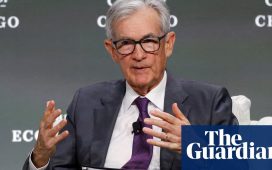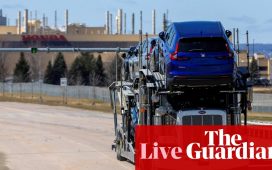Bank of England faces MPs: the key points
Here’s the key points from the Treasury Committee’s hearing on the collapse of Silicon Valley Bank UK:
The collapse of Silicon Valley Bank was the fastest since Barings failed in the 1990s, the governor of the Bank of England has said, revealing he was surprised by the speed of its demise.
Andrew Bailey warned the Treasury committee, which is investigating the sale of SVB UK to HSBC for £1, that:
“We are in a period in very heightened, frankly, tension and alertness.”
Bailey told MPs that the failure of SVB this month was the fastest passage from “health to death, really, since Barings”, which was brought down by rogue trader Nick Leeson in 1995.
Deputy BoE Governor Dave Ramsden agreed on the need for vigilance, saying:
“We’ll keep a close eye on bank funding costs, what the consequences of those could be for households and businesses, equally looking out for other risk factors, we have to remain incredibly vigilant.”
Bailey insisted, though, that the UK banking sector was in a strong position, despite the turmoil in the sector.
He said that there had been several offers for SVB UK during the weekend after its parent company collapsed, but that it took until 4am on Monday 13th to know that a sale to HSBC would go ahead – that’s just three hours before it was announced.
Bailey said that recent market turmoil, such as last Friday’s wobble, was a sign that the global markets are testing “quite a lot” of the banking sector, rather than in response to specific problems.
He insisted that the UK would not follow Switzerland’s move, of wiping out holders of AT1 bonds before shareholders (as occurred in the Credit Suisse rescue).
Bailey choosing his words carefully on Credit Suisse: “There is a resolution plan for CS which is agreed internationally… the Swiss then implemented something instead of that.”
— Laura Noonan (@LauraNoonanFT) March 28, 2023
Bailey on Swiss AT1 actions: “It does complicate things because it makes the credit hierarchy more complicated and probably less intuitive. We do not want our banks doing that.”
— Laura Noonan (@LauraNoonanFT) March 28, 2023
Bailey said he did not believe authorities should implement 100% protection of all bank deposits.
And he cautioned that there is some evidence of that financial conditions are tightening, and that the Bank would lower its countercyclical capital buffer if the credit supply to economy is under threat.
Key events
Closing post
Time to wrap up… here are today’s main stories:
European markets close
After a relatively calm day, the FTSE 100 has closed 12 points higher at 7484 tonight, a gain of 0.17%.
Oil giant BP was the top riser, up 2.3%, followed by airlines group IAG (+2.2%), while miners Glencore and Rio Tinto both gained 2% as fears that the banking crisis would trigger an economic downturn faded.
France’s CAC 40 index was 0.2% higher, while Spain’s IBEX gained 0.4% and Germany’s DAX was 0.1% higher.
Just in: Next, the UK high street chain, has agreed to buy fashion and homeware brand Cath Kidston for £8.5m.
The move comes after Cath Kidston fell into administration in 2020.
In a statement to the City this afternoon, Next says:
The Company announces that it has agreed to acquire the brand name, domain names and intellectual property of CK Acquisitions Ltd from the administrators for consideration of £8.5m.
The cathkidston.com domain will be licenced back to the administrators for a period of up to 12 weeks to effect stock clearance, prior to relaunch under the Company’s ownership.
Back in Washington DC, regulators are signalling that the banking sector may see its biggest regulatory overhaul in years.
Federal Reserve Vice Chair for Supervision, Michael Barr, told today’s Senate Banking Committee hearing that:
“The failure of SVB illustrates the need to move forward with our work to improve the resilience of the banking system.”
Bank of England governor Andrew Bailey was right to warn last night that the age of social media makes it more likely that digital bank runs can happen, says Professor Costas Milas, of the Management School of the University of Liverpool.
He explains:
It has already been established that social media, tweets in particular, contain valuable information that predicts movements in financial assets. My own (co-authored) work, for instance, finds contagion effects from “Grexit” tweets across European bond markets. So it is not a surprise that social media creates contagion effects from SVB’s troubles across markets.
The question, for Andrew Bailey and policymakers, is how far we need to go towards regulating social media.
Europeans favour government intervention much more than the public in the United States. This raises the issue of how effective government intervention might turn out to be, in the absence of coordinated governmental actions across the world…
Last Friday’s market turmoil could have been sparked by a single trade in Deutsche Bank bond insurance.
Bloomberg explains;
Regulators are singling out a trade on Deutsche Bank AG’s credit default swaps that they suspect fueled a global selloff on Friday.
It was a roughly €5 million ($5.4 million) bet on swaps tied to the German bank’s junior debt, according to people familiar with the matter, who said regulators have spoken to market participants about the transaction. The contracts can be illiquid, so a single bet can trigger big moves.
5M€ trade in an illiquid market caused the Deutsche Bank markets carnage on Friday? Where are the derivatives book fearmongers when they are needed? pic.twitter.com/FEqqglT2h4
— Michael A. Arouet (@MichaelAArouet) March 28, 2023

Mark Sweney
Back in the UK, Gary Lineker has won his battle with HMRC over a £4.9m tax bill.
The tax authorities had told the Match of the Day host, who operates his own company and works on a freelance basis for the BBC and BT Sport, that he should have been classed as an employee, my colleague Mark Sweney reports.
The former England striker had appealed to a tribunal in relation to the action by HMRC, linked to the off-payroll working rules or IR35 legislation, which argued that in fact he was a “disguised employee”.
However, on Tuesday a judge ruled that Lineker was a freelancer who had direct contracts with the two broadcasters.
FDIC chairman Martin J. Gruenberg also told the Senate Banking commitee that “The state of the U.S. financial system remains sound despite recent events”.
Gruenberg explained that the FDIC has been closely monitoring liquidity, including deposit trends, across the banking industry, adding:
Since the action taken by the government to support the banking system, there has been a moderation of deposit outflows at the banks that were experiencing large outflows the week of March 6.
In general, banks have been prudently working preemptively to increase liquidity and build liquidity buffers.
FDIC Chairman Martin Gruenberg then explains that Silicon Valley Bank and Signature Bank were “allowed to fail”, in a way that guaranteed deposits.
Shareholders lost their investment, unsecured creditors took losses, and the boards and most senior executives were removed, Gruenberg tells the Senate Banking Committee.
Over in Washington, policymakers are also probing the collapse of Silicon Valley Bank.
The Senate Committee on Banking, Housing and Urban Affairs has begun a hearing into SVB.
Committee chair, senator Sherrod Brown, says the collapse of SVB left its customers worried that they not be able to pay their staff, due to venture capitalists “panicking on Twitter” and fuelling the bank run at the bank.
Brown says:
Once again, small businesses and workers feared they would pay the price for others’ bad decisions.
“The scene of the crime” does not start with the regulators who will testify today, Brown adds, pointing the finger instead at mismanaged banks and an industry that lobbied for looser regulations during the Trump administration.
The committee must consider how banks such as SVB and Signature Bank “exploded in size”. Brown continues. He says the underlying causes are “Hubris, entitlement” and “greed”, saying executive pay at SVB was tied to growth at the bank.
Brown also lashes the venture capitalists who fuelled Silicon Valley Bank’s growth by telling their clients to keep their money at SVB, only to then fuel this month’s bank run by telling them to take their money out, causing more chaos and panic.
Brown says pointedly:
Just as there are no atheists in foxholes, it appears that when there is a bank crash there are no libertarians in Silicon Valley.”
Brown: “It appears that when there’s a bank crash, there are no libertarians in Silicon Valley.”
— Pete Schroeder (@peteschroeder) March 28, 2023
US consumer confidence increased slightly in March
US consumer confidence has increased a little this month, despite the turmoil in the banking sector.
The Conference Board’s Consumer Confidence Index, just released, increased slightly in March to 104.2, up from 103.4 in February, and higher than expected.
whoa
*US MARCH CONSUMER CONFIDENCE AT 104.2; EST. 101.0
— Tom Hearden (@followtheh) March 28, 2023
Although consumers were slightly less optimistic about the present economic situation, their economic expectations nudged up a little.
The cutoff date for the survey was March 20th, about ten days after the bank failures in the United States.
Ataman Ozyildirim, senior director for economics at The Conference Board, explains:
“Driven by an uptick in expectations, consumer confidence improved somewhat in March, but remains below the average level seen in 2022 (104.5). The gain reflects an improved outlook for consumers under 55 years of age and for households earning $50,000 and over.”
“While consumers feel a bit more confident about what’s ahead, they are slightly less optimistic about the current landscape. The share of consumers saying jobs are ‘plentiful’ fell, while the share of those saying jobs are ‘not so plentiful’ rose.
The latest results also reveal that their expectations of inflation over the next 12 months remains elevated—at 6.3 percent. Overall purchasing plans for appliances continued to soften while automobile purchases saw a slight increase.”








